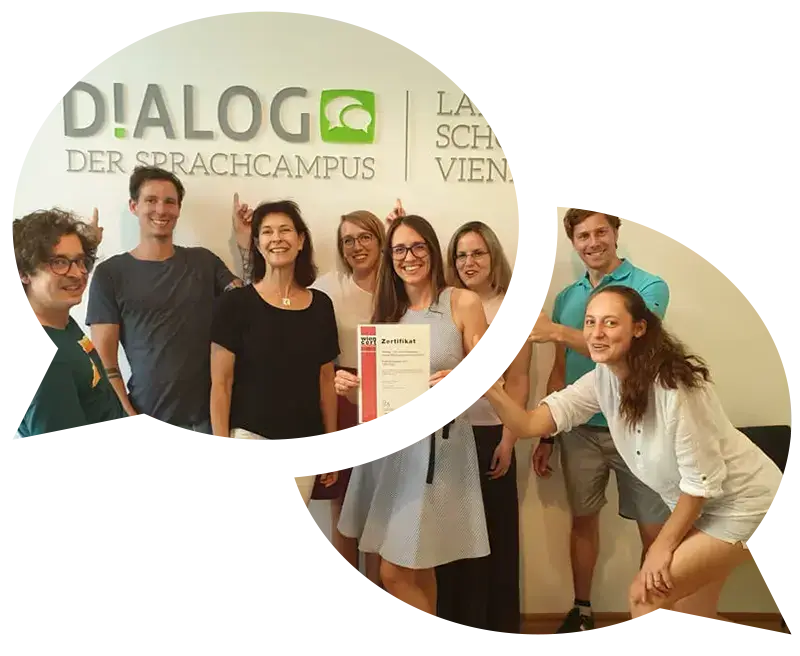Improve your German – our tips
Here are our 7 tips to help you improve your German.
Would you like to improve your German language skills? We have collected 7 tips that can help you. Not all tips are suitable for everyone: So pick the ones that suit your learning style. There’s something for almost every aspect of the language – from listening to speaking to reading & writing.
1. Always keep on learning
Once you’ve started learning a language, you should stay on the ball. Unfortunately, it’s not like cycling – you can unlearn a language. So you can improve your German in the classic way by learning from level to level: after A1 comes A2 and so on. Once you have reached your desired level, you can keep yourself “fit” through films, magazines (see below) and, of course, as many conversations as possible with native speakers.
Between some levels, however, it is also advisable to take a break from learning grammar and improve your speaking in German – ideally with a conversation course, e.g. between A2.2 & B1.1 or after B2.2 & before C1.1. If you have no problem speaking German, you can brush up on your grammar skills at B level, for example with our Grammatik aktiv course, for self-study we recommend the book of the same name.
2. Learn with native speakers
If you learn German in Vienna or another German-speaking city, you have ideal conditions to improve your German with native speakers. Use the skills from your German course in real-life situations: Do you have kindergarten or school children? Then talk to the other parents at pick-up time. Do you like sports? You could also sign up for sporty group activities: Football, yoga, running groups, fitness – there are so many options.
If you don’t have children or are less active in sports, you can take part in social or cultural events to improve your German: Guided tours in museums, book clubs, discussion groups at university or a pub quiz in German. If you already have German-speaking friends, you can also simply meet up for a coffee or a walk and have a parner:innen interview (here an example from our conversation course).
You should also make sure you learn from native speakers: Every course at DIALOG is led by trainers at native speaker level who can also give you insights into the culture of German-speaking countries. All group courses also have German as the language of instruction, so your understanding and speaking of German will be on a solid footing right from the start.
3. Use German-German dictionary
If you have already reached a certain level (e.g. B1.2 ), a German-German dictionary can also help you improve your German. In this way, you not only translate words, but you often also understand their meaning straight away. Admittedly, this method is not always easy, but it also helps with memorizing new vocabulary. The PONS publishing house even offers such a dictionary online in the German as a foreign language version . Of course, Langenscheidt also offers an analog alternative .
A tip for those who are particularly busy: Write your own dictionary with example sentences in which you understand the corresponding word immediately when you read the sentence! Classic notebooks help ensure that handwritten notes are better remembered. With Quizlet, for example, you can also create online flashcards with which you can test your knowledge regularly and from anywhere. This way you can improve your German without too much effort.
4. Watch series and films in German
Do you just want to let yourself be showered ? Of course, series and films also help to improve your German. We recommend that you watch content with German as the original language . These are almost always more authentic than dubbed versions from other languages. Austrian films and series, for example, often contain typical or regional expressions , which can be very helpful for your everyday life here – this would be a good addition to our Viennese workshop .
You can find our “Watchlist” in the highlights on Instagram , and our blog not only contains film tips from our trainers , but also recommendations for series ( Part 1 | Part 2 ) on Netflix. You can of course also enter Austrian or German films as a category when searching . Newer uploads often have the “CC” option for subtitles. These closed captions are usually exact transcriptions of the dialogues, where you can see the actual words spoken. This means that the particularly hard-working people can be active and optimally expand their own dictionary (see above) .
5. Read newspapers and magazines in German
This tip for improving your German is a classic and simply shouldn’t be missed. Reading all kinds of texts has a positive effect on vocabulary , not only in your native language, but also in foreign languages . Newspapers and magazines are certainly among the more entertaining sources because you can choose the topics yourself depending on your interests. This is also the first concrete tip: Read what excites you! This will help you remember newly learned words much better.
Another positive aspect of reading is that you learn constructions that will help you improve your written German . After all, written language uses much more complex structures than oral language. Last but not least, by reading the news you learn a lot of important things about the culture, country and people of German-speaking countries and are informed about current events, so that you can also take part in conversations with native speakers . This is also an essential part of our concept for the conversation courses .
Since we are a language school in Vienna, we would like to recommend Austrian daily and weekly newspapers : Falter (particularly recommended for events in Vienna), Der Standard , Die Presse , Kurier (“classic daily newspapers”) & the news magazine Profil . Other magazines offer you special topics, e.g. Ballesterer (for football), the chefs at DIALOG also like the “Freshly Cooked” magazine, which is available at Billa’s checkout. There is also a magazine specifically for those learning German, which we really recommend: Deutsch PERFECT . Visit us – especially the conversation course – and we will give you further tips to improve your German with magazines.
6. Don’t be afraid of making mistakes
German with the four cases, the three genders, the many plural forms and so on and so forth is considered a difficult language , even among native speakers. We also know from research and our practice that adults have a much more difficult time learning new skills than children. If you want to improve, you have to put what you have learned into practice and mistakes will inevitably happen . German offers many possibilities for this: wrong article, wrong case, wrong verb position, etc. The important thing is that you don’t close yourself off and keep trying – remember the old saying: you learn from mistakes!
It is certainly helpful that native German speakers are, for once, a little more tolerant of errors in their language: an incorrect adjective ending or a sentence order error does not significantly disrupt communication . But: Ask your German-speaking acquaintances to correct you if you make mistakes, because tolerance is often so great that they don’t do this on their own. Another tip to improve yourself through mistakes is for texts: If you write them in Word, Google Docs, etc., you can initially write in German without auto-corrections and then turn them on at the end. This way you can see straight away what you did wrong and also have a corrected version of your sentences. Of course, AI also offers a completely new option here, e.g. ChatGPT .
7. Attend language courses
We understand something about tip number 7. From our experience and that of our current and former course participants, we know that most people improve most effectively when they take a language course . If you e.g. For example, if you start with no prior knowledge ( A1.1 ), it often helps that you learn with people who are in the same situation . Interacting with others provides immediate practical application of what you have learned, which immediately solidifies your new skills. It is also very important that you always have a trainer at your side who you can ask questions about if you have any uncertainties and who always gives you direct feedback .
If it’s been a while since your last course and you’re feeling a bit rusty , there are several options: You can repeat individual levels in intensive or evening courses , improve your speaking skills in a conversation course and gain the necessary self-confidence there, or in a grammar course refresh structures that have already been forgotten . Last but not least: Do you need help with a specific aspect of the language that is not adequately covered in a group training? Individual training sessions with specialized trainers are also available to you, which we can of course also offer upon request.
Melde dich jetzt für einen Deutschkurs in Wien an und lerne effektiv Deutsch in Kleingruppen und mit hochqualifizierten Lehrkräften.
Zu kompliziert? Wir können helfen!
Of course, there are many more tips that can help you improve your language skills. Our office team and our trainers are the ideal starting point for this. Send us your course inquiry or simply come and visit us at Esterhazygasse 34/5 – we will be happy to provide you with further tips and advice personally.
January 2024







